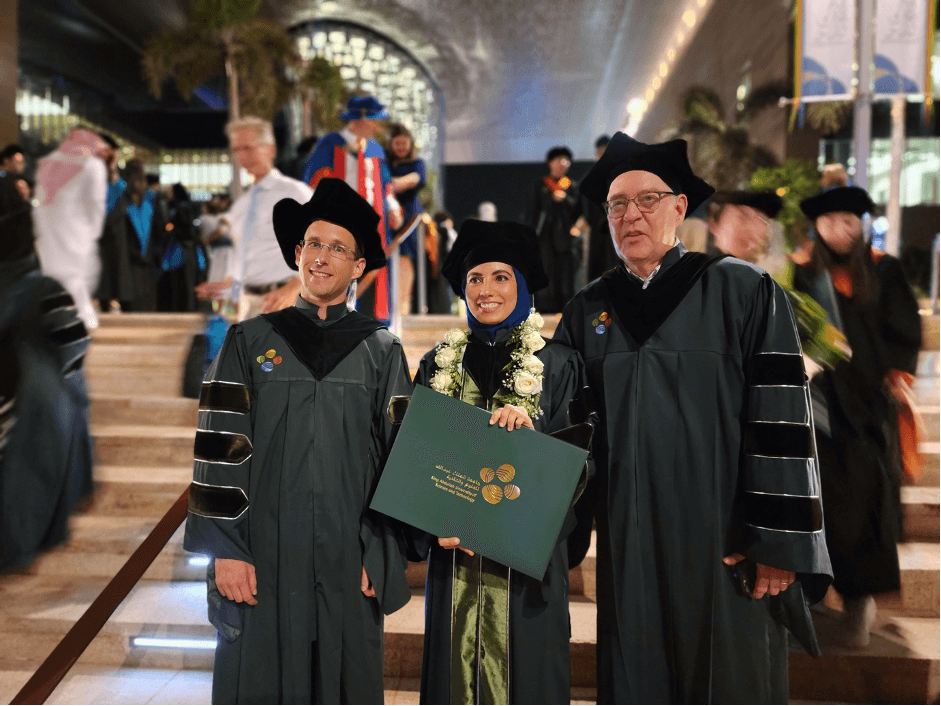Unveiling new insights through ancient DNA

Nurtured in elementary school, Hanin Ahmed’s passion for biology persists. After obtaining her Ph.D. in plant science from KAUST, Hanin continued her research as an Ibn-Rushd Postdoctoral Fellow at The Centre for Anthropology and Genomics of Toulouse, France
Enthusiastic about biology since childhood, Hanin Ahmed recalls the day, as an eight-year-old student in an elementary school in Madinah, when she performed her first experiment and observed it under an optical microscope. The hidden world she encountered left her in awe, and that sense of wonder has stuck with her ever since.
Fueled by the flame of her childhood dream, Hanin’s thirst for knowledge has grown throughout her educational journey. After graduating from Taibah University in Madinah, Hanin joined KAUST as a Ph.D. student in the Plant Science program under Professor Simon Krattinger’s mentorship. She vividly remembers discovering KAUST at a postgraduate open-day event at Taibah University, toward the end of her undergraduate studies.
“What truly sealed my decision to join KAUST was the unique and immersive environment it offered. The opportunity to collaborate with researchers from diverse backgrounds, engage in cutting-edge interdisciplinary projects, and be part of a close-knit community of like-minded individuals was unparalleled. Continuing my studies at KAUST was the natural progression for me.”
Inspired and encouraged by Krattinger, Hanin delved into the complexities of plant genomics. Her Ph.D. research focused on the population genomics and evolutionary history of fonio millet, an indigenous West African millet species with a great potential for dryland agriculture, and einkorn wheat, the first domesticated wheat species and pivotal to the birth of agriculture around 10,000 years ago.
“We made significant discoveries in cereal population genomics. For instance, we found that the genetic diversity of fonio millet is influenced by different ethnic groups in West Africa, highlighting the impact of social factors on fonio genomic patterns. Additionally, our research on einkorn wheat shed light on the role of genomic introgressions in shaping population structure and genetic diversity of einkorn wheat, providing insights into wheat adaptation during the early stages of agriculture”.
The findings of the einkorn study, which provide a basis for accelerating the genomics-assisted improvement of einkorn and bread wheat, were published in Nature, the world’s leading multidisciplinary science journal.
During her Ph.D. studies, Hanin greatly valued the opportunities that allowed her to engage in teaching and actively participate in scientific discussions with the University’s diverse scientific community. All this made her journey at KAUST a transformative experience.
“KAUST not only provided me with the necessary tools and opportunities to pursue captivating scientific endeavors, but also molded me into a better version of myself. The diverse environment, encompassing individuals from various nationalities, languages, and backgrounds, combined with the high quality of life, creates an unparalleled atmosphere [...] It has been an extraordinary journey of personal and academic growth”.

Hanin Ahmed with Professor Simon Krattinger (left), her Ph.D. supervisor, and Professor Rod Wing (right), her Ibn Rushd Fellowship mentor.
Hanin’s scientific curiosity and personal determination, along with her deep fascination for the rich cultural and historical heritage of the Kingdom of Saudi Arabia, influenced the next step on her scientific journey. After graduating from KAUST, she joined the laboratory of Prof. Ludovic Orlando, a world-renowned scholar in the field of ancient DNA and evolutionary genomics, at the Center for Anthropology and Genomics of Toulouse (CAGT), France. Based on genome-wide analysis of ancient and modern DNA samples, this fast-developing field investigates the evolution of species’ genomes, uncovering the past genetic diversity and evolutionary history of various species, including humans. It helps us to understand how selection, migration, and genetic mixing influence genomes over long periods and contribute to present genetic diversity, and how populations of plants and animals respond to environmental changes, diseases, or human activities.
Hanin’s current research focuses on sequencing the whole genomes of over 1000 horse samples, comprising both modern and ancient horses from diverse regions across four continents. Through this project, she aims to investigate the genomic structure of horse populations, shedding light on the source and timing of admixture within these populations. As part of her project, she also plans to collect samples in the Kingdom. She is particularly excited about the recent identification of over 27,000 new archaeological sites in Saudi Arabia containing remains of animals and signs of ancient organisms. In her opinion, these sites hold immense potential for further discoveries.
Hanin Ahmed’s research at the CAGT is supported by the prestigious Ibn-Rushd Postdoctoral Fellowship Award granted by KAUST. This competitive program, designed to support exceptional Saudi scholars in pursuing postdoctoral experience at globally recognized host institutions, offers a unique opportunity to receive initial funding, enabling successful recipients to establish independent academic careers with a strong focus on research and higher education. In addition, each scholar is supported by a mentor from KAUST and they are entitled to use KAUST’s state-of-the-art facilities and resources.
While she enjoys her work and life in Toulouse and underlines the importance of this experience, Hanin sees it as a temporary stop on her professional journey:
“My dream is to establish an Ancient DNA Research Center in Saudi Arabia. I am especially interested in leading the efforts to establish the tools, expertise, and skills needed to unravel the old history and cultural heritage of Saudi Arabia and the Middle East using ancient DNA.”
Given that the Arabian Peninsula was at the crossroads of ancient trade routes and empires, its immense historical significance is beyond question. While genetic studies within the region have been somewhat limited so far, it is a matter of time before more novel discoveries come to fruition. Hanin Ahmed is determined and committed to shape her country’s future by bringing her scientific ideas to life, and not even wild horses could drag her away.

